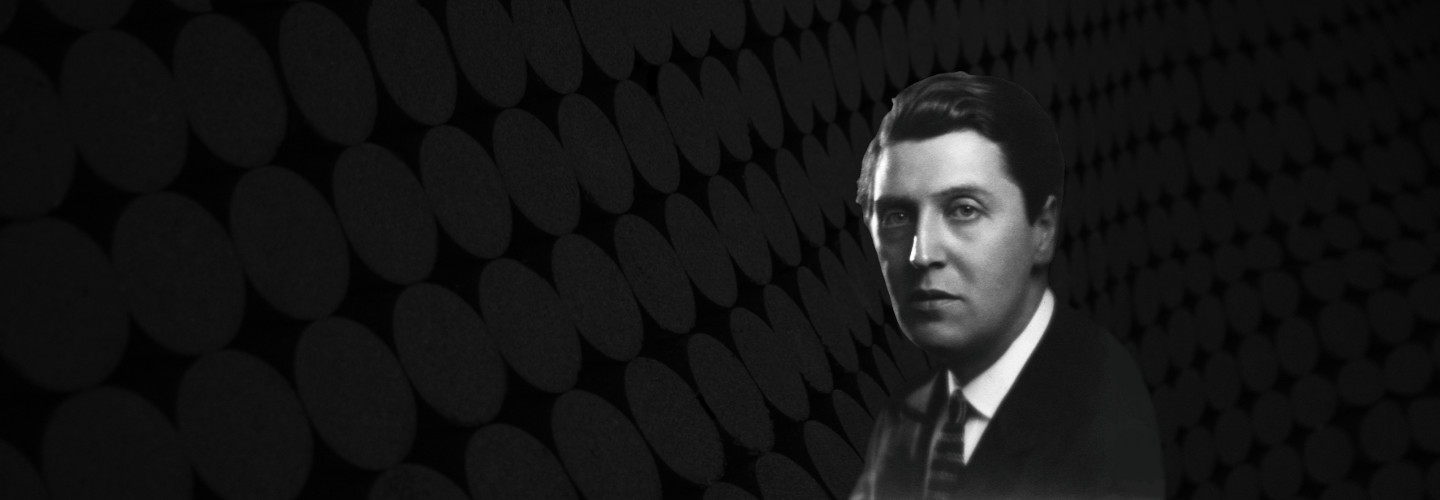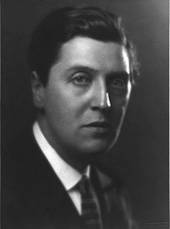

Alban Berg
*9 February 1885
†24 December 1935
Works by Alban Berg
Biography
9.2.1885 – born in Vienna as the son of the book-seller Conrad Berg and his wife Johanna, née Braun.
1900 – his father dies on 30th March. Begins to compose songs. His life-long asthma problem starts.
1903 – Berg failed the Matura and falls into depression. In September he even considered commiting suicide.
1904 – Berg passes the Matura and starts a practical training in accounting in the "Statthalterei" in Lower Austria. Simultaneously, he attends lectures in law and musicology. He takes private lessons with Arnold Schönberg which are even free of charge until 1906 because of his precarious financial situation. Acquaintance with Webern.
1905 – attends a performance of Frank Wedekind’s Pandora’s Boxdirected by Karl Kraus.
1906 – thanks to a heritage he is in a position to give up his hateful office job. Acquaintance with Nahowski.
1907 – on 7th November first public performance of three Songs and Fugue for string quartet and piano.
1910 – finishes his studies with Schönberg. He composes the String quartet op. 3
1911 – World premiere of Piano sonata and the String quartet on 14th April, on 3rd May he marries Helene Nahowski. Gustav Mahler dies on 18th May.
1912 – composes Five songs on picture postcard texts by Peter Altenberg op. 4.
1913 – on 31st March world premiere of two songs from Five songs on picture postcard texts by Peter Altenberg which causes a riot. Completes Four Pieces for clarinet an piano op. 5
1914 – on 14th May Berg attends a performance of Georg Büchner’s Woyzeck and decides to set the play to music.
1915 – as of August until the end of the war he serves in the army, in Hungary at first. Because of his health problems Berg is sent into the war ministry. He starts to work on Wozzeck
1918 – the ‘Society for Private Musical Performance’ is founded under the aegis of Arnold Schönberg and will be dissolved in 1921.
1920 – Successful activity as a writer. For a long time Berg cannot make up his mind whether to continue to compose or to focus on writing.
1921 – completes Wozzeck.
1922 – The piano score of Wozzeck is published by the composer with the financial support of Alma Mahler.
1923 – signs a publishing contract with Universal-Edition in Vienna who also publish his early works.
1924 – world premiere of parts from Wozzeck in Frankfurt am Main by Hermann Scherchen.
1925 – he composes the Lyric Suite for string quartet which is premiered by the Kolisch-Quartett on 8th January 1927.
World premiere of Wozzeck at the Berliner Staatsoper conducted by Erich Kleiber on 14th December.
1926 – Wozzeck is performed in Prag.
1927 – Wozzeck is performed in Leningrad. Berg considers to set to music Gerhart Hauptmann’s fairy tale Und Pippa tanzt.
1928 – decides to set to music the Lulu theme by Frank Wedekind. Arranges the second, third and fourth movement of the Lyric Suite for string orchestra.
1929 – Wozzeck is performed in Oldenburg . The opera will be performed at another 25 theaters during Berg’s lifetime.
1930 – appointment as member of the "Preußischen Akademie der Künste".
1932 – purchases a holiday residence at the Wörthersee.
1933 – on 3rd December he completes the Lied der Lulu which is dedicated to Webern’s 50th birthday.
1934 – In April Berg puts the finishing touches to Lulu. The world premiere is scheduled for Berlin under Erich Kleiber. Through mediation of Arnold Schönberg the Library of Congress in Washington acquires the manuscript of the Wozzeck score. On 30th November Symphonic Pieces from the opera Lulu is premiered at the Berliner Staatsoper under Erich Kleiber. Because of the hostilities against Kleiber and the press campaign Kleiber emigrates in January 1935. Berg’s works are no longer performed in Germany.
1935– Interrupts his work on the opera Lulu from April until August and composes the Violin Concerto ("Dem Andenken eines Engels") for Manon Gropius, Alma Mahler’s daughter from her second marriage with the architect Walter Gropius who died from cerebral palsy.
Lulu was left incomplete at his death. The Austrian composer Friedrich Cerha added a 3rd act. The 3-act version was premiered in Paris on 24th February 1979 in Paris.
1936 – on 19th April world premiere of the Violin Concerto by the violinist Louis Krasner and the conductor Hermann Scherchen in Barcelona.
24.12.1935 – Berg suffers a blood poisoning caused by an insect bite and dies on 24th December in Vienna.
About the music
Pierre Boulez once called Alban Berg "the last greenhouse plant of the late romantic period". This was meant in a very appreciative way. For in this way Berg also conceived his works in an impressive way, with an expressive glow always smouldering at the bottom. Artistic expression meant everything to Berg. It is not without reason that it is always pointed out that without Berg, Arnold Schönberg's Viennese School would have remained an elitist cause.
Berg allowed himself to be influenced by Schönberg's system of compositions "with twelve tones only related to each other," but not domesticated. He sought the dialectic connection between the freedom of musical appearance and its strictly circumscribed construction. For Berg, composing means first and foremost: organizing and layering, as well as designing large, expansive forms that can be combined with superiority, architectural view can be planned.
The fact that this did not lead to sterile sound experiments has to do with Berg's conviction that sensuality is not just a catchphrase, but a artistic principle. In an interview for Austrian radio, Berg stressed that all so-called "atonal" sounds, even the most complex ones, "must be subjected to the sharpest control of hearing, both external and internal".
Berg's precision in the elaboration of his works was legendary. This explains his manageable catalog of works. According to the score of Wozzeck (1917 to 1922) he completely renounced opus numbers, because he was ashamed to progress so slowly with his works. Berg composed exclusively masterpieces, including two operas that are among the most performed of the 20th century. In the concert field, Berg has created works that have long been part of the repertoire: Violin Concerto, Chamber Concerto, Lyric Suite, orchestral pieces op.6 are of a quality that has not been surpassed in the 20th century.
Wolfgang Schaufler
